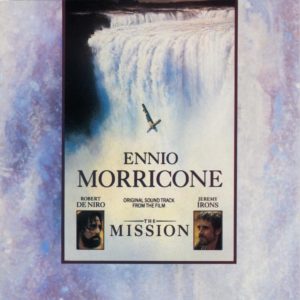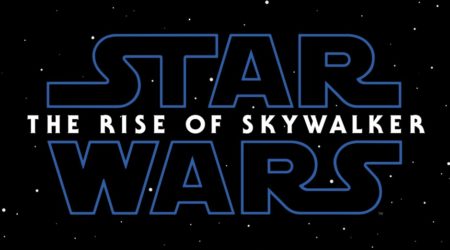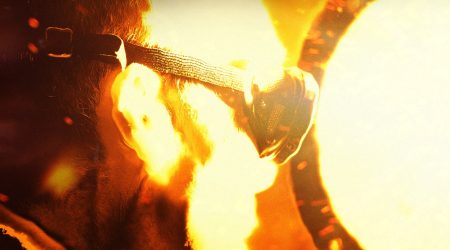
I was very sad to learn of the passing of Maestro Ennio Morricone at the age of 91 due to a fall. Surprisingly, not only film music fans were devastated by this loss, but also people in my social circle knew who he was, and, more importantly, knew some of his music. During his massive career, he has written music for more than 500 movies. While a lot of fellow film music writers are publishing their thoughts about him and his music in general, I would like to focus on his film music that had the most impact on me. His most popular music is, of course, the brilliant soundtracks he has written for the Westerns like The Good, The Bad and The Ugly, A Few Dollars More and Once Upon a Time in the West The soundtrack I am most fond of, however, is The Mission, a movie about a Jesuit missionary in 18th-century South America, where the original inhabitants of the jungle, called the Guarani, are under threat from Spanish and Portuguese forces. While I have had the score in my collection for a long time, I had never actually seen the movie, so I decided that the unfortunate event of Morricone’s passing would be an opportunity to experience how the gorgeous music is implemented in this movie.
The music for the movie is built around three themes and the first two can be heard in the first track “On Earth As It Is In Heaven,” which is also the music that can be heard during the end credits. The first theme is the famous melody from “Gabriel’s Oboe”. If you do not know this particular cue, you should definitely explore it. Ever since I heard that cue, I knew that this track would be one of my favorite film music tracks, which it still is to this day. It is the gorgeous melody on the oboe which makes this piece, in my honest opinion, a masterpiece. There are two tracks with the name “Gabriel’s Oboe” on this album and in general, they are quite similar with some small differences. It sounds logical to assign this theme to the Jesuit priest Gabriel, who is played by Jeremy Irons, but the music can also be heard when the recently converted Jesuit ex-mercenary Mendoza is reunited with his ‘instrument,’ a sword. In another scene where both characters are having an emotional moment, the oboe theme can be heard as well. For this reason, I will call this wonderful melody the priest theme.
The second theme, which can be heard in “On Earth As It is In Heaven,” represents the Guarani. It plays as a counter-melody, performed by the choir, to the priest theme. You can hear a version with percussion and a jungle flute in “Asuncion.” In “River” you hear the choir version by itself, without the priest theme, which is a joyful sounding piece and quite a contrast to the battle scene during which this piece can be heard.
The third theme can be heard during the scenes with beautiful Iguazú Falls, which appears for the first time in the track with the fitting title “Falls.” What I love about this theme is its simplicity, and it shows one of the strengths of Morricone’s music. When you look at the main melody of the theme, it is just a simple pattern, but the slowness of it, the way the notes are played by the musicians – in the case of “Falls” by a jungle flute – and the counter melodies in the background, makes this track a masterpiece. In “Climb” the falls theme is part of a marvelous musical buildup. In “Remorse” the melody of the theme is used in a dark and moody way, before a brighter version of the theme is performed by an oboe. In “Penance” the music opens with a moody sounding melody, started on a contrabassoon, where the rest of the orchestra takes over that melody, with a sad sounding version of the falls theme in the middle of that piece. In “The Mission” you hear a more orchestral version of the theme, and lastly, the theme can be heard in the final track “Miserere,” in which a boy soprano sings the melody.
The Guarani in the movie are converted Christians, and a large group of them are singing in a choir in the movie, for which Morricone wrote two pieces. They can be heard in “Ave Maria Guarani” and “Te Deum Guarani.” What I noticed about these pieces is one soprano singing over the other choir members, making the recording less perfect and giving it a more natural sound, which is a good fit for these scenes.
Finally, there are two tracks on the album I would like to mention, which do not contain one of the three themes. “Brothers” and “Charlotte” are both pieces of music with a flute, strings, and a guitar to give both tracks a bit of a Spanish feel, which fits perfectly well with these characters being Spanish. While these tracks do not contain one of the three themes, the music is still a good fit for the movie.
It was quite a wonderful experience for me to hear this amazing score in combination with the images on the screen. What I have learned from watching this movie with Morricone’s music is that “less is more,” when it is implemented well. Each time you hear the not overly complicated music in the movie, it really adds to the story. If you listen to Morricone’s music you will not only find that his melodies are amazing, but he was also a genius in choosing the right sound for that melody, by using a wide range of instruments.
Also worth mentioning is the fact that the Guarani theme and the priest theme blend so well together: telling the audience that both theme aspects, the priests and the Guarani, are one and the same at the end of the movie. In case you do not know this soundtrack from the late Ennio Morricone, give it a listen. But I can also recommend other magnificent scores next to his music for the Spaghetti Westerns, like Cinema Paradiso, Once Upon a Time in America, The Untouchables and Maddalena. Ennio Morricone will be missed, but he leaves his legacy of more than 500 soundtracks behind, which we can enjoy and remember him by for ages to come.
Listen or buy
- Buy this soundtrack from Amazon.com or Apple Music
- Listen to this soundtrack on Spotify
- Request a track of this soundtrack on StreamingSoundtracks.com
Tracklist
The highlights are in bold.
- On Earth As It Is In Heaven (3:50)
- Falls (1:55)
- Gabriel’s Oboe (2:14)
- Ave Maria Guaraní (2:51)
- Brothers (1:32)
- Carlotta (1:21)
- Vita Nostra (1:54)
- Climb (1:37)
- Remorse (2:46)
- Penance (4:03)
- The Mission (2:49)
- River (1:59)
- Gabriel’s Oboe (2:40)
- Te Deum Guaraní (0:48)
- Refusal (3:30)
- Asuncíon (1:27)
- Alone (4:25)
- Guaraní (3:56)
- The Sword (2:00)
- Miserere (1:00)
Total length: 48 minutes
Virgin (1986)




